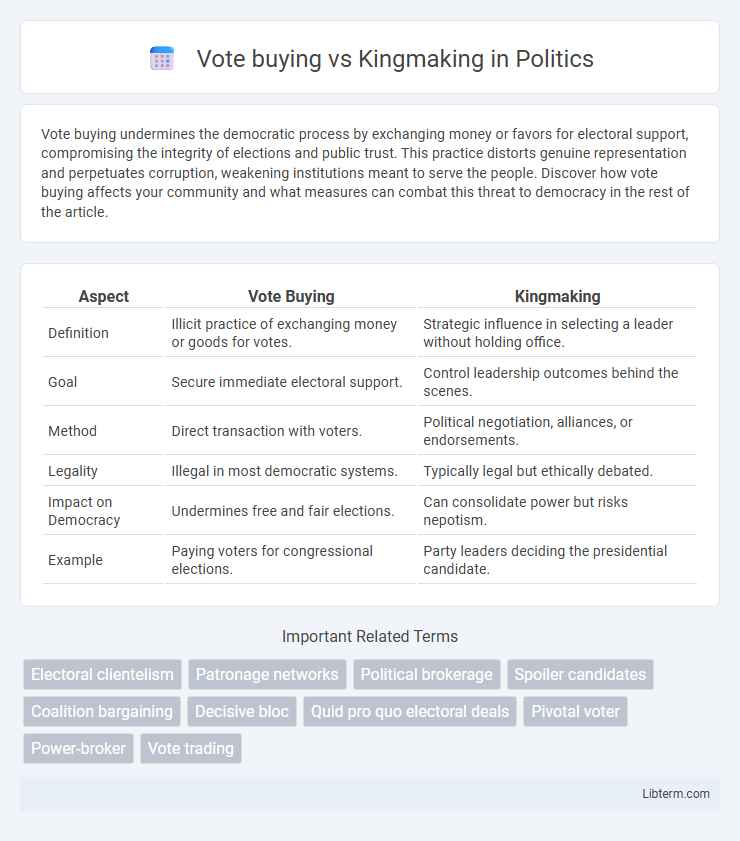Vote buying undermines the democratic process by exchanging money or favors for electoral support, compromising the integrity of elections and public trust. This practice distorts genuine representation and perpetuates corruption, weakening institutions meant to serve the people. Discover how vote buying affects your community and what measures can combat this threat to democracy in the rest of the article.
Table of Comparison
| Aspect | Vote Buying | Kingmaking |
|---|---|---|
| Definition | Illicit practice of exchanging money or goods for votes. | Strategic influence in selecting a leader without holding office. |
| Goal | Secure immediate electoral support. | Control leadership outcomes behind the scenes. |
| Method | Direct transaction with voters. | Political negotiation, alliances, or endorsements. |
| Legality | Illegal in most democratic systems. | Typically legal but ethically debated. |
| Impact on Democracy | Undermines free and fair elections. | Can consolidate power but risks nepotism. |
| Example | Paying voters for congressional elections. | Party leaders deciding the presidential candidate. |
Introduction to Vote Buying and Kingmaking
Vote buying involves the illegal practice of offering money or goods to influence voters' choices, undermining democratic integrity and fairness. Kingmaking refers to the strategic manipulation by influential individuals or groups to determine election outcomes without directly contesting, often shaping political power behind the scenes. Both phenomena disrupt transparent electoral processes, eroding public trust and democratic accountability.
Definitions: Vote Buying vs Kingmaking
Vote buying involves offering money or incentives to voters in exchange for their support in an election, directly influencing the election outcome through unethical means. Kingmaking refers to the act of a powerful individual or group influencing the selection of a leader or winner without seeking the position themselves, often by swaying votes or negotiations behind the scenes. Both practices undermine democratic processes, but vote buying targets voters, while kingmaking manipulates decision-making among candidates or factions.
Historical Context and Evolution
Vote buying, historically rooted in transactional politics, emerged prominently during the 19th-century elections, where monetary incentives manipulated electoral outcomes. Kingmaking, a practice dating back to medieval monarchies, involved influential nobles or factions endorsing or installing rulers, shaping political power without direct rule. Over time, both phenomena evolved with democratic expansion, with vote buying becoming covert corruption and kingmaking shifting to political endorsements and power brokers in modern electoral systems.
Mechanisms of Vote Buying
Vote buying involves the direct exchange of goods, money, or favors to influence voters' choices, typically through conditional incentives ensuring voter compliance. Mechanisms of vote buying include offering cash payments, providing essential services, or distributing commodities in return for electoral support, often exploiting economic vulnerabilities or social networks. Contrarily, kingmaking centers on strategic influence by elites to determine power succession without direct voter inducement, relying on political alliances and negotiation rather than transactional exchanges.
Tactics and Strategies of Kingmaking
Kingmaking tactics center around influencing outcomes by endorsing or manipulating other candidates' support bases rather than directly securing votes, often leveraging coalition-building, strategic alliances, and negotiation to position a preferred candidate for victory. These strategies prioritize long-term influence and power consolidation through indirect control, utilizing negotiation skills to sway pivotal voters or delegates at critical moments. Unlike vote buying, which relies on transactional exchanges for immediate voter support, kingmaking emphasizes coordinated political maneuvering and alliance management to shape election results.
Legal Perspectives and Ethical Implications
Vote buying undermines democratic principles by corrupting electoral processes and violates laws designed to ensure free and fair elections, often resulting in severe legal penalties including fines and imprisonment. Kingmaking, while sometimes legal, raises significant ethical concerns as it manipulates political power behind the scenes, potentially subverting voter intent and accountability. Both practices erode public trust in governance, challenging the legitimacy of elected officials and the overall integrity of political systems.
Impact on Democratic Processes
Vote buying undermines democratic integrity by corrupting electoral outcomes through bribery and coercion, distorting the genuine will of the electorate. Kingmaking manipulates power dynamics by enabling influential actors to control candidate selection or election results behind the scenes, subverting transparency and accountability. Both practices erode public trust in democratic institutions, weaken voter autonomy, and impair the legitimacy of governance systems.
Case Studies: Global Examples
Vote buying, a corrupt electoral practice where money or favors are exchanged for votes, contrasts sharply with kingmaking, the strategic manipulation of power to install preferred leaders. In the 2013 Nigerian general elections, vote buying significantly skewed results by undermining democratic integrity, while in Malaysia's 2020 political crisis, kingmaking played a critical role as political actors orchestrated the collapse of one coalition to elevate a new prime minister without a direct electoral mandate. These cases highlight diverse impacts on governance: vote buying erodes voter autonomy globally, whereas kingmaking reshapes political outcomes through elite maneuvering.
Preventive Measures and Reforms
Preventive measures against vote buying include stringent enforcement of election laws, transparent campaign financing, and voter education programs emphasizing ethical participation. Reforms such as implementing electronic voting systems and establishing independent electoral commissions help reduce opportunities for kingmaking by ensuring fair candidate selection and minimizing political manipulation. Strengthening whistleblower protections and promoting civic engagement further guard against these corrupt practices in democratic processes.
Future Trends and Conclusions
Vote buying, a prevalent form of electoral manipulation, is increasingly challenged by sophisticated kingmaking strategies where influential actors ensure the rise of preferred candidates without direct monetary exchange. Future trends indicate the rise of digital surveillance and data analytics to detect and thwart vote buying, while kingmaking may evolve through opaque coalition-building and social media influence operations. Effective electoral reforms combined with advanced AI monitoring systems are essential to uphold democratic integrity and counteract these evolving threats.
Vote buying Infographic

 libterm.com
libterm.com